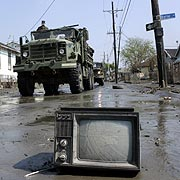Untitled Document
 |
A military truck moves along
a street in the Ninth Ward area of New Orleans. Pentagon officials may
loosen limits on the military's domestic role. |
President Bush's push to give the military a bigger role in responding
to major disasters like Hurricane Katrina could lead to a loosening of legal
limits on the use of federal troops on U.S. soil.
Pentagon officials are reviewing that possibility, and some in Congress agree
it needs to be considered.
Bush did not define the wider role he envisions for the military. But in his
speech to the nation from New Orleans on Thursday, he alluded to the unmatched
ability of federal troops to provide supplies, equipment, communications, transportation
and other assets the military lumps under the label of "logistics."
The president called the military "the institution of our government most
capable of massive logistical operations on a moment's notice."
At question, however, is how far to push the military role, which by
law may not include actions that can be defined as law enforcement — stopping
traffic, searching people, seizing property or making arrests. That prohibition
is spelled out in the Posse Comitatus Act of 1878, enacted after the Civil War
mainly to prevent federal troops from supervising elections in former Confederate
states.
Speaking on the Senate floor Thursday, Sen. John Warner, R-Va., chairman of
the Armed Services Committee, said, "I believe the time has come that we
reflect on the Posse Comitatus Act." He advocated giving the president
and the secretary of defense "correct standby authorities" to manage
disasters.
Presidents have long been reluctant to deploy U.S. troops domestically,
leery of the image of federal troops patrolling in their own country or of embarrassing
state and local officials.
The active-duty elements that Bush did send to Louisiana and Mississippi included
some Army and Marine Corps helicopters and their crews, plus Navy ships. The main
federal ground forces, led by troops of the 82nd Airborne Division from Fort Bragg,
N.C., arrived late Saturday, five days after Katrina struck.
They helped with evacuations and performed search-and-rescue missions in flooded
portions of New Orleans but did not join in law enforcement operations.
The federal troops were led by Lt. Gen. Russel Honore. The governors commanded
their National Guard soldiers, sent from dozens of states.
Defense Secretary Donald Rumsfeld is reviewing a wide range of possible changes
in the way the military could be used in domestic emergencies, spokesman Lawrence
Di Rita said Friday. He said these included possible changes in the relationship
between federal and state military authorities.
Under the existing relationship, a state's governor is chiefly responsible
for disaster preparedness and response.
Governors can request assistance from the Federal Emergency Management Agency.
If federal armed forces are brought in to help, they do so in support of FEMA,
through the U.S. Northern Command, which was established in 2002 as part of
a military reorganization after the 9/11 attacks.
Di Rita said Rumsfeld has not made recommendations to Bush, but among the issues
he is examining is the viability of the Posse Comitatus Act. Di Rita called
it one of the "very archaic laws" from a different era in U.S. history
that limits the Pentagon's flexibility in responding to 21st century domestic
crises.
Another such law, Di Rita said, is the Civil War-era Insurrection Act, which
Bush could have invoked to waive the law enforcement restrictions of the Posse
Comitatus Act. That would have enabled him to use either National Guard soldiers
or active-duty troops — or both — to quell the looting and other
lawlessness that broke out in New Orleans.
The Insurrection Act lets the president call troops into federal action
inside the United States whenever "unlawful obstructions, combinations
or assemblages — or rebellion against the authority of the United States
— make it impracticable to enforce the laws" in any state.
The political problem in Katrina was that Bush would have had to impose federal
command over the wishes of two governors — Kathleen Blanco of Louisiana
and Haley Barbour of Mississippi — who made it clear they wanted to retain
state control.
The last time the Insurrection Act was invoked was in 1992 when it was requested
by California Gov. Pete Wilson after the outbreak of race riots in Los Angeles.
President George H.W. Bush dispatched about 4,000 soldiers and Marines.
Di Rita cautioned against expecting quick answers to tough questions like whether
Congress should define when to trigger the president's authority to send federal
troops to take charge of an emergency, regardless of whether a governor agreed.
"Is there a way to define a threshold, or an anti--cipated threshold,
above which a different set of relationships would kick in?" Di Rita asked.
"That's a good question. It's only been two weeks, so don't expect us to
have the answers. But those are the kinds of questions we need to be asking."

